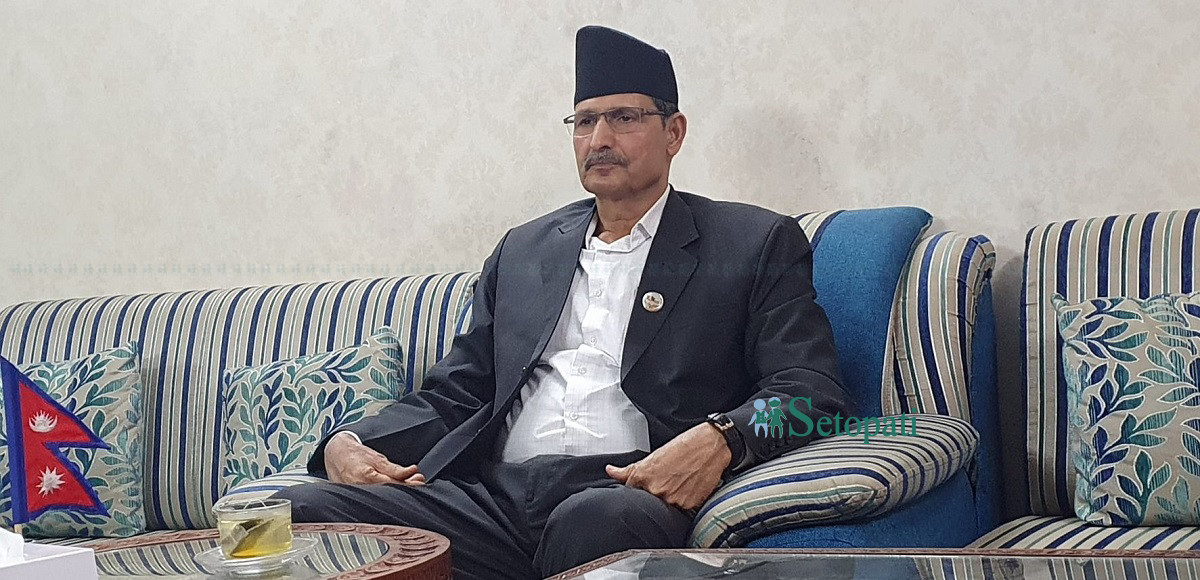Speaker Agni Sapkota has sat on the impeachment process against Chief Justice (CJ) Cholendra Shumsher Rana violating the House of Representatives (HoR) regulations and the principle of natural justice that gives an accused a chance to defend against the allegations.
A total of 98 ruling HoR members had registered the impeachment motion against CJ Rana on February 13. He has been suspended since then.
CPN (Maoist Center) lawmaker Dev Gurung, who had proposed the impeachment motion along with Pushpa Bhusal of Nepali Congress (NC) and Jeevan Ram Shrestha of CPN (Unified Socialist), had presented the impeachment proposal for discussion in the House on March 13.
Clause 161 of the HoR regulations has set a deadline for each step in a way that speaker cannot sit on the process once an impeachment proposal is registered. Speaker is obliged to set a date for discussion within seven days of registration. If the House session is not on, the House session should be called within 15 days and discussion on the proposal held within three days of the start of session as per the regulations.
But Speaker Sapkota has not held discussion on the proposal six weeks after start of the budget session of the federal parliament.
Speaker Sapkota had formed an 11-strong impeachment recommendation committee on March 6. The committee includes four CPN-UML lawmakers Bishnu Paudel, Lal Babu Pandit, Shiva Maya Tumbahangphe, and Krishna Bhakta Pokharel; Min Bahadur Bishwakarma and Ram Bahadur Bista from Nepali Congress; Yashoda Subedi and Rekha Bista from CPN (Maoist Center); Kalyani Khadka from CPN (Unified Socialist); Ekbal Miya of Loktantrik Samajwadi Party (LSP); and Pramod Sah from Janata Samajwadi Party (JSP).
Dev Gurung had presented the impeachment proposal for discussion in the House on March 13. Speaker Sapkota had scheduled the discussion for March 16 but the government ended the House session before March 16.
The impeachment proposal has yet to be sent to the impeachment recommendation committee as required by the HoR regulations. The issue has to be concluded within three months of the impeachment proposal reaching the recommendation committee.
The ruling coalition has adopted the strategy of stretching the impeachment process until Rana retires in November.
UML lawmaker Pandit, who is in the recommendation committee, recently raised the issue of delay in impeachment process in the current House session. “How will the people take abuse of the impeachment provision in the Constitution?” he asked but Speaker Sapkota, who was chairing the House meeting, ignored Pandit’s questions.
Former speaker Daman Nath Dhungana holds Speaker Sapkota responsible in freezing of the impeachment process. “It is the speaker’s responsibility to move the impeachment process forward. It is the responsibility of speaker and those who registered the impeachment motion to move the process forward in accordance to the Constitution,” Dhungana states.
He has accused the ruling coalition of trying to use the Constitution as per their convenience and has added that Speaker Sapkota should have sent the impeachment proposal to the recommendation committee once the committee was formed. “There are talks about ending the House session, holding elections. There is also question as to what will happen after that. Nobody has the sense of responsibility.”
The committee could have summoned Rana and questioned him if the proposal were sent to the committee. Rana, for his part, could have defended himself against the allegations. But Speaker Sapkota sitting on the process means the accusations have neither been proved nor has Rana received a clean chit.
Constitutional expert and former NC lawmaker in the National Assembly Radheshyam Adhikari says freezing the impeachment process is not judicially acceptable. “CJ is the first person of the supreme body of the judiciary. Such person can be accused if there are grounds. The HoR has the rights. But debate on the issue has been avoided by not moving the process forward. That is not appropriate. This should immediately be moved forward,” Adhikari stresses.
He calls the freezing of the process an obstruction of justice. “Moving the impeachment process is semi-judicial work. The accused (Rana) should get justice in accordance to the House procedure. Let the House do what it has to do, there is no grounds to take exception to that. But one cannot sit on it without moving the process forward.”

